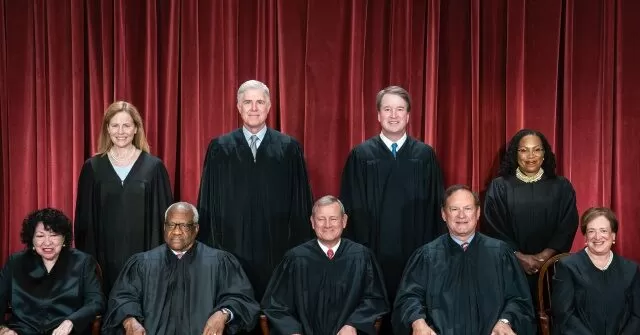The Supreme Court of the United States (SCOTUS) has agreed to hear oral arguments in May on a case that centers on President Donald Trump’s historic executive order to end birthright citizenship for the U.S.-born children of illegal aliens. This decision by the highest court in the land has sparked a heated debate among Americans, with some applauding the move and others vehemently opposing it. However, one thing is certain – this case has the potential to shape the future of our nation and its immigration policies.
President Trump’s executive order, issued in 2018, aims to end the practice of granting automatic citizenship to children born in the United States, even if their parents are in the country illegally. This practice, known as birthright citizenship, has been a part of the U.S. Constitution since the 14th Amendment was ratified in 1868. The amendment states that “all persons born or naturalized in the United States, and subject to the jurisdiction thereof, are citizens of the United States and of the State wherein they reside.”
The case before the Supreme Court challenges the constitutionality of President Trump’s executive order, arguing that it goes against the 14th Amendment and the long-standing tradition of birthright citizenship in the United States. The plaintiffs, a group of U.S. citizens and their children who would be affected by the order, argue that it is discriminatory and violates their rights as citizens.
On the other hand, supporters of the executive order argue that it is necessary to address the issue of illegal immigration and to prevent the abuse of birthright citizenship. They argue that the 14th Amendment was never intended to grant citizenship to the children of those who are in the country illegally, and that it is being misinterpreted.
The decision of the Supreme Court in this case will have far-reaching consequences, not just for the children of illegal immigrants, but for the entire immigration system in the United States. It will also have a significant impact on the ongoing debate over immigration reform and border security.
The fact that the Supreme Court has agreed to hear this case is a testament to its importance and the need for a definitive ruling on the issue. It is a bold move by the court, as it has not taken up a case on birthright citizenship in over a century. This decision also highlights the significance of the current administration’s efforts to address the issue of illegal immigration and its impact on the country.
President Trump has been a vocal critic of birthright citizenship, calling it a “magnet” for illegal immigration and vowing to end it during his campaign. His executive order was met with both praise and criticism, with some arguing that it is a necessary step to address the issue of illegal immigration, while others see it as an attack on the rights of U.S. citizens.
The Supreme Court’s decision in this case will not only have an impact on the current administration’s policies, but it will also set a precedent for future administrations and their approach to immigration. It is a crucial moment for the court to uphold the principles of the Constitution and ensure that the rights of all citizens are protected.
As the arguments are set to be heard in May, the nation will be watching closely to see how the Supreme Court will rule on this contentious issue. It is a moment that will shape the future of our country and its immigration policies, and it is imperative that the court makes a just and fair decision.
In the end, this case is not just about birthright citizenship, but about the very fabric of our nation and the values it stands for. It is a reminder that the United States is a nation of immigrants, and that our diversity is what makes us strong. Let us hope that the Supreme Court will uphold this belief and make a decision that reflects the true spirit of America.










